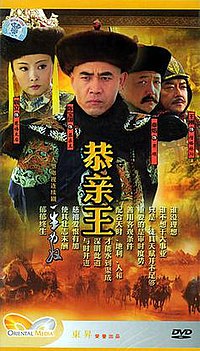Sigh of His Highness
| Sigh of His Highness | |
|---|---|

DVD cover art
|
|
| Genre | Historical drama |
| Written by | Yang Xiaoxiong Gu Yi Liu Shaoling |
| Directed by | Li Wenlong |
| Presented by | Shu Zhan Li Ming Zhao Qi Guo Changjian |
| Starring |
Chen Baoguo Yuan Li Wang Yan Wang Gang Qin Yan Song Jia Luo Xiangjin |
| Theme music composer |
Anson Hu Liang Jijue Tan Yizhe |
| Opening theme | 1. Zang Yingxiong (葬英雄) performed by Anson Hu 2. Si Da Jie Kong (四大皆空) performed by Anthony Wong (Hong Kong version) |
| Ending theme | Chuntian (春天) performed by Leo Ku |
| Composer(s) | Jiang Jianyi Zhou Zhihua |
| Country of origin | China |
| Original language(s) | Mandarin |
| No. of episodes | 40 |
| Production | |
| Executive producer(s) | Chen Wenguang Chen Tanwen Ling Li Zhong Lifang Zou Xiaoli Wang Manlin |
| Producer(s) | Gao Zhiqiang Yang Ziqing Chen Yuguang Jing Shuiqing Zhang Huiling Han Xueyi Zhao Hua |
| Location(s) | China |
| Cinematography | Bu Xiangyi Kong Jinsheng |
| Editor(s) | Yuan Fei Dai Tao Zhu Jun Wang Shen |
| Running time | 45 minutes per episode |
| Production company(s) | 1. Fujian Radio Film and TV Group 2. Shanghai Soft-Trek Culture Media 3. Beijing Galloping Horse Film & TV Production 4. Wuzhou Media Centre 5. Anhui TV |
| Distributor | Shanghai Soft-Trek Culture Media Hong Shimei Sun Xiaodong Qian Li Zhang Xian |
| Release | |
| Original network | Sichuan TV (China) TVB Jade (Hong Kong) |
| First shown in | 26 March 2006 (China) 26 April 2007 - 16 October 2008 (Hong Kong) |
| Sigh of His Highness | |||||||
| Traditional Chinese | 一生為奴 | ||||||
|---|---|---|---|---|---|---|---|
| Simplified Chinese | 一生为奴 | ||||||
| Literal meaning | Slave for a Lifetime | ||||||
|
|||||||
| Alternative Chinese name | |||||||
| Traditional Chinese | 恭親王傳奇 | ||||||
| Simplified Chinese | 恭亲王传奇 | ||||||
| Literal meaning | The Legend of Prince Gong | ||||||
|
|||||||
| Transcriptions | |
|---|---|
| Standard Mandarin | |
| Hanyu Pinyin | Yìshēng Wéinú |
| Transcriptions | |
|---|---|
| Standard Mandarin | |
| Hanyu Pinyin | Gōngqīnwáng Chuánqí |
Sigh of His Highness is a Chinese historical television series based on the life of Prince Gong, an influential Manchu prince and statesman of the late Qing dynasty. The series was directed by Li Wenlong and starred Chen Baoguo as Prince Gong. It was first broadcast on Sichuan TV in China in 2006.
The series is set in 19th-century China under the Manchu-led Qing dynasty. Prince Gong is a younger half-brother of the Xianfeng Emperor, but their relationship is somewhat strained because they previously competed for the succession to their father's throne. In 1860, during the Second Opium War, when the Anglo-French forces close in on Beijing, the Xianfeng Emperor flees to the Chengde Summer Palace in Hebei and orders Prince Gong to stay behind in the capital, Beijing, to make peace with the enemy. After enduring humiliation and manoeuvring his way through complex negotiations, Prince Gong signs the Convention of Beijing on behalf of the Qing Empire with the British, French and Russians. With this achievement, he not only improves his political standing in the imperial court, but also earns the respect of the foreigners.
The following year, the Xianfeng Emperor dies in Chengde. His young son, Zaichun, succeeds him as the Tongzhi Emperor. Before his death, the Xianfeng Emperor had appointed the senior minister Sushun and seven others to serve as regents for his son until he is old enough to rule on his own. In November 1861, with support from the Empress Dowagers Cixi and Ci'an, Prince Gong launches the Xinyou Coup and succeeds in seizing power from Sushun and the regents. In the next four years, Prince Gong reaches the pinnacle of his political career as he is appointed Prince-Regent and placed in charge of important state and military affairs, including control over the Grand Council. He also has the opportunity to take the throne but refrains from doing so. He spearheads the Self-Strengthening Movement and introduces new policies in his attempts to modernise China and maintain friendly relations with other countries.
...
Wikipedia
